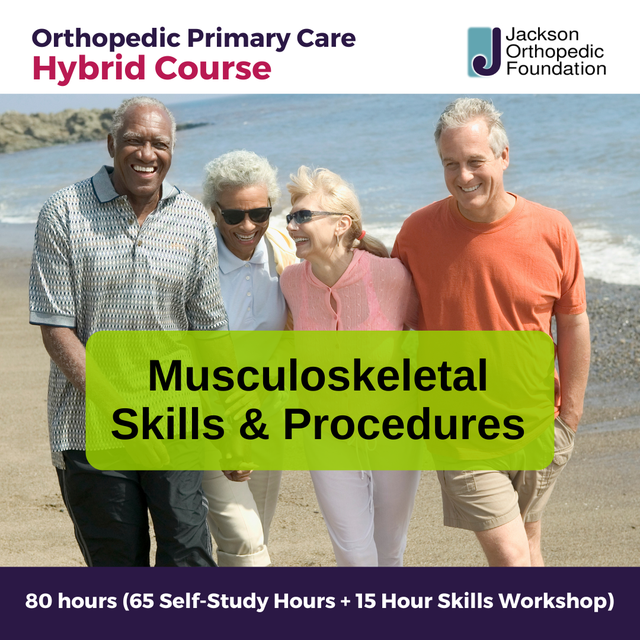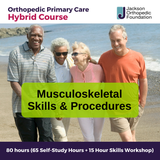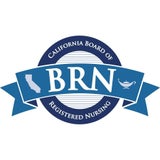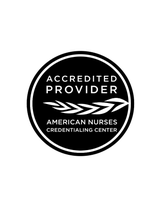- All Courses
- >
- Hybrid Course: MSK Skills & Procedures
Hybrid Course: MSK Skills & Procedures
SKU:
$500.00
$500.00
Unavailable
per item
CE Value: 80 hours (65 hours self-study + 1 15-hour skills weekend Workshop in Lafayette, California). CE hours valid in any state.
Once you purchase this course we'll email you a login to our online learning platform in 24-48 hours.
Once you purchase this course we'll email you a login to our online learning platform in 24-48 hours.
Need to improve your skills & confidence in treating patients with musculoskeletal conditions? This blended-learning course covering the scientific underpinnings and evidence for advanced clinical skills specific to treating stable MSK conditions in primary care settings.
This course includes 65 hours online study plus a corresponding 2-day (15 hour) Orthopalooza Workshop, scheduled for January 2025 (dates to be announced). The workshop will be held in Lafayette, California.
The course is ideal for nurse practitioners, clinical nurse specialists and APRNs. Also great for physicians and other APPs. In addition to adding valuable job skills to your resume, you'll be able to help patients maximize function, manage pain, prevent re-injury, and slow disease progression -- as well as help your practice reduce unnecessary referrals.
This course includes 65 hours online study plus a corresponding 2-day (15 hour) Orthopalooza Workshop, scheduled for January 2025 (dates to be announced). The workshop will be held in Lafayette, California.
The course is ideal for nurse practitioners, clinical nurse specialists and APRNs. Also great for physicians and other APPs. In addition to adding valuable job skills to your resume, you'll be able to help patients maximize function, manage pain, prevent re-injury, and slow disease progression -- as well as help your practice reduce unnecessary referrals.
Content includes
Online study:
The scientific underpinnings and evidence for advanced clinical skills specific to treating stable MSK conditions in primary care settings. The Course also discusses the evidence for a wide range of techniques for pain management and functional rehabilitation available to primary care
providers.
In the associated Workshop, scheduled for January 2025 (dates to be announced):
a combination of demonstration and simulation is used to build skills for performing arthrocentesis, joint and trigger point injections, casting and splinting, assistive
devices use, and exercise instruction.
Specifically, the MSK Skills and Procedures Workshop covers:
1. Injections & Arthrocentesis
Evidence-based techniques for corticosteroid injections are presented emphasizing principles of safety and efficacy. Skill lab sessions provide students with time to practice every injection technique on anatomical simulator models that provide audio feedback when needle placement is accurate. Lab sessions
will cover:
Upper Extremity
Lower Extremity
2. Splinting & casting
The casting and splinting skills lab covers basic musculoskeletal injury immobilization and management in accordance with the National Association of Orthopaedic Technologists curriculum. Participants practice applying and removing splints and casts with coaching and feedback from experienced clinicians. Lab sessions cover:
3. Maximizing function & managing pain
This lab focuses on interventions aimed at increasing patients’ ability to control MSK pain, maximize function, and prevent further injury through a variety of self-management and lifestyle changes. Participants will learn to discuss, use, demonstrate, and prescribe evidence-based modalities and devices including:
The scientific underpinnings and evidence for advanced clinical skills specific to treating stable MSK conditions in primary care settings. The Course also discusses the evidence for a wide range of techniques for pain management and functional rehabilitation available to primary care
providers.
In the associated Workshop, scheduled for January 2025 (dates to be announced):
a combination of demonstration and simulation is used to build skills for performing arthrocentesis, joint and trigger point injections, casting and splinting, assistive
devices use, and exercise instruction.
Specifically, the MSK Skills and Procedures Workshop covers:
1. Injections & Arthrocentesis
Evidence-based techniques for corticosteroid injections are presented emphasizing principles of safety and efficacy. Skill lab sessions provide students with time to practice every injection technique on anatomical simulator models that provide audio feedback when needle placement is accurate. Lab sessions
will cover:
- The scientific foundation for arthrocentesis, joint injections, and trigger point injections
- Indications for arthrocentesis, joint injections, and trigger point injections
- Contraindications for arthrocentesis, joint injections, and trigger point injections
- Indications for orthopedic consultation and referral
- Review of the evidence for optimal dose and medication selection for MSK injections
- Simulation of common upper and lower extremity injections using anatomical models
- Injection techniques are presented for the following joints:
Upper Extremity
- Subacromial space: Olecranon bursa
- Glenohumeral joint: Carpal tunnel
- Acromioclavicular joint: De Quervain’s tenosynovitis
- Bicipital groove: Trigger finger
- Medial epicondyle: First carpometacarpal joint
- Lateral epicondyle: Trigger point injections
Lower Extremity
- Trochaneric: Bursa
- Foot & Ankle: Tibiotalar joint
- First metatarsophalangeal joint
- Morton’s neuroma
- Heel spurs
- Knee injection/aspiration: Tibiofemoral joint space
- Pes anserine bursa
- Iliotibial band bursa
2. Splinting & casting
The casting and splinting skills lab covers basic musculoskeletal injury immobilization and management in accordance with the National Association of Orthopaedic Technologists curriculum. Participants practice applying and removing splints and casts with coaching and feedback from experienced clinicians. Lab sessions cover:
- Evaluation and management of patients with acute musculoskeletal injuries
- Fundamentals of casting and splinting procedures
- Complications of casting and splinting
- Fundamentals of casting and splinting procedures
- Complications of casting and splinting
- Common upper extremity immobilization techniques: splint and cast application
- Short-arm splint and cast
- Long-arm splint and cast
- Thumb spica cast
- Boxers cast/radial/ulnar gutter splints/casts
- Sugar tong splint
- Common lower extremity immobilization techniques: splint and cast application
- Short-leg stirrup splinting/casting
- Long-leg cast application
- Cast removal: safety and proper use of the cast saw
3. Maximizing function & managing pain
This lab focuses on interventions aimed at increasing patients’ ability to control MSK pain, maximize function, and prevent further injury through a variety of self-management and lifestyle changes. Participants will learn to discuss, use, demonstrate, and prescribe evidence-based modalities and devices including:
- Non-narcotic medications, nutriceuticals, and supplements
- Safe, progressive exercise programs for strength, flexibility, and balance
- Soft tissue manipulation tools and techniques
- Canes, walkers, crutches and other mobility supports
- Adaptive devices
- Ergonomic modifications
- Weight management







